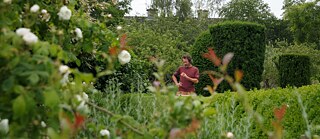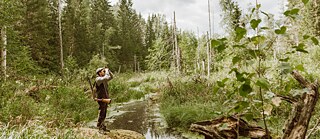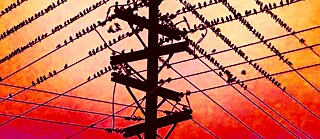The Power of Awe
Wonder
Americans on the East Coast were in awe when Brood X, an enormous group of 17-year cicadas, suddenly emerged from underground to mate. Melissa Gerr, who lives in Maryland, was no exception. Inspired by this local wonder, she sets out to explain the feeling of awe.
Listen to this episode: Apple Music | Spotify | Download
This feature was produced by Melissa Gerr, an audio producer with a penchant for the fascinating. She is lucky to be based in Baltimore, Maryland, where there are many wonderful and awe-inspiring people and things to tell the world about. She works as a producer at Baltimore’s WYPR. Listen to more of her work on the station’s website. In this episode, Melissa turns to scientists, philosophers, and spiritualists to learn more about awe and wonder. Rosa Diaz of the Space Telescope Science Institute and Nick Spero of the Natural History Society shed light on wonder in nature. Arndt Büssing, a doctor and professor at Witten/Herdecke University, and David Yaden, a researcher at Johns Hopkins University, take a whack at the philosophical and spiritual side. Most of the music featured in this episode was licensed via Blue Dot Sessions. The sound of thunderstorms comes from the_toilet_guy. Michelle Watson supplied the sound of cicadas chirping in Georgia. Melissa Gerr provided the sounds of frogs — and, of course, more cicadas. James Wisnieski took the photo for this episode in Washington, D.C.
Transcript
[SOUND OF CICADAS SINGING]
Michelle Watson: I think that experiencing awe in life, that feeling of awe and amazement is absolutely vital. You know, it’s like an endorphin rush. And I think a world without awe and amazement and wonder and new things, would be ... maybe not a life worth living.
Melissa Gerr: When was the last time you felt jaw-dropping awe? Michelle Watson, who you just heard, isn’t a scientist, but she almost perfectly describes what researchers are discovering that humans can experience in a ‘state of awe.’
[SOUND OF CICADAS SINGING]
Melissa Gerr: Michelle experienced it in a big way recently, thanks to a tiny creature called a cicada. Picture something like a huge flying beetle. They periodically emerge in plague-like proportions in the U.S. — and that sound you hear in the background ... is what Michelle recorded when millions of them were singing on her property. In a few minutes we’ll hear more about why cicadas blew Michelle’s mind.
But first, a little bit about why and how we experience wonder and awe ... and why those feelings could actually benefit health and even humanity.
[MUSIC PLAYING IN THE BACKGROUND]
Melissa Gerr: My name is Melissa Gerr and well, I’m a pretty easy mark when it comes to getting sucked in by nature’s awe ... Like the sheer engineering brilliance of a flower. Or the terror and wonder of a total solar eclipse, the vastness of the ocean, the brilliance of a meteor shower ... But you don’t have to listen to me ... There are enthusiastic educated people who make it their mission to help others access the wonder and awe around us.
Nick Spero: I had white perch fillets and cicadas for breakfast this morning — no joke, it’s poor man’s surf and turf.
Melissa Gerr: [LAUGHS] Really poor man’s surf and turf. Oh my god, ok ...
[MUSIC]
Nick Spero: Hi, I’m Nick Spero. I’m a board member at the Natural History Society of Maryland. I’m a retired entomologist and nature has been my drug of choice throughout my entire life. It gets to my soul. It, it means everything to me to be able to connect to the natural world and to have a sense of how all of the natural world is interconnected.
Melissa Gerr: Interconnectedness ... That’s another big clue into how awe and wonder are beneficial. We’ll hear more about that later too, but first a quick dip into the Natural History Society of Maryland: Edmund ‘Doc’ Fladung, a son of German immigrants, founded it in 1929. He saw the value in preserving nature and giving the public easy access to it.
Nick Spero: We expose people to all facets of nature. We have a fossil club — we take trips looking for fossils — we have a Lep Club — ‘Lepidoptera’ is the world of insects that moths and butterflies are in — and we teach proper husbandry: We send kids of all ages home with caterpillars with the proper knowledge on how to raise them. We take walks out to [SPRING PEEPERS SOUND] vernal pools to show people the amphibian activity in there. So, we really expose people to a lot of different aspects of nature and for the most part people walk away pretty amazed and refreshed with a new sense of what nature’s all about.
Melissa Gerr: So, that all sounds lovely and interesting, but to what end?
Nick Spero: Years ago, we had a meeting at the Natural History Society and this was a group of pretty influential people — professional paleontologists, biologists, you name it — and something came up about, we’re getting older. We need to turn stewardship of all of these things over to the younger crowd. And my response was, stewardship implies an intimate knowledge of these things. And I said, how do you turn stewardship over to somebody that doesn’t understand these things? So, when I say understand these things, I’m talking about the interrelationship of all aspects of nature. To have an appreciation for that and understand how things depend upon each other in nature and one link taken out can really unravel a lot of things. So, to be able to instill that appreciation in nature to others is important to me. If I can instill that awe in somebody, they may become better stewards of their backyard, a bigger scene, just any little part of that.
[MUSIC]
Nick Spero: About a hundred years ago when my daughter was in kindergarten, I would take caterpillars to her class and the teachers would raise them. They had names for them, they were amazed with them! And maybe a week later, the tent pet caterpillars started coming out. And these caterpillars are walking across the sidewalk and parents picking their children up are stepping on them. All of a sudden, these children came over and said, please be careful — don’t step on those caterpillars! So, in such a short period of time, these children, kindergarten-aged children, were — they were afraid of these caterpillars when they first came in. Now, they’re stewards of these caterpillars. They wanna protect them! To me, that was so gratifying to see a change in a young child. Their eyes were open to a certain aspect of nature they’d never seen before and now they felt part of that and they wanted to protect that. So, anytime that I can connect people to nature, and they get it. And it’s like: Wow!
Melissa Gerr: A perfect description, Nature is like: Wow! And experiencing that wow factor can make us feel connected to and therefore more protective of the environment. Now, we move from the terrestrial to the celestial. Because another generator of ‘awe and wonder’ that makes its home here in Baltimore is the Space Telescope Science Institute. It’s basically ground control for the Hubble Space Telescope that has been capturing breathtaking, never–before-seen images of the universe and sending them back to earth. STSCI also stores the images to make them available to researchers all over the world. And not only that, they’re building the next bigger and better one: the James Webb Space Telescope, set to launch on October 31st this year. Rosa Diaz is one of those people helping humanity explore the universe.
[MUSIC STOPS]
Rosa Diaz: I’m the branch deputy of the Missions Engineering and Science Analysis branch. We do work with the instrument scientists that calibrate the data of the different instruments that are in Hubble — or that will be in James Webb — and with the developers of the software to make sure that the observations that the scientists get have the best quality for their science.
[MUSIC]
Melissa Gerr: Rosa serves as a critical conduit between the scientists and the software developers. She kind of translates for the two parties to make sure they both get what they need. And working at the home of the world’s most powerful lenses into the universe is a dream job for her.
[MUSIC STOPS]
Rosa Diaz: I grew up in Mexico in Guadalajara. And I was always a very curious person, I always wanted to know how things work. And since I was a child, I will always try to understand, even how a car will work. So when I grew up, I started to try to understand more about the science and more about our ecosystem. And eventually, I think watching Carl Sagan, I just totally was sold into astronomy. I think that one event that really [MUSIC STARTS PLAYING] motivated me to study astronomy was observing a lunar eclipse. I remember that I was very, I was very young, and I woke up very early to see this lunar eclipse. Seeing how the moon looked like, really like a sphere floating in the sky, it just made me wonder how that happened. So, I started to get more information about astronomy, and eventually everything just, worked for me to study astronomy, which I mean it has been very, very, very exciting career.
Melissa Gerr: Clearly, Rosa is no stranger to awe and wonder — so much so it’s hard for her to discern what stands out most in her duties as she helps scientists explore the universe. But still, she doesn’t take that for granted.
Rosa Diaz: I think everything is mind-blowing in there. I mean, it is very exciting to see how the work that I do enables scientists to get all the results that you see in the news, to get those images that you see in the discoveries. So for example, one of the images that I loved the most is the Ultra-Deep Field that show us a lot of galaxies in our universe from a region that we thought was, we didn’t see anything. And then when we took that image, there were a lot of galaxies. Galaxies that were formed long time ago, and that was breathtaking. I mean, I just, it was very exciting to be able to see that image.
Melissa Gerr: Another important part of Rosa’s job is to educate the public, especially kids in the Latino community. She uses her passion for astronomy to ignite an excitement for the sciences in young minds. Because — like she experienced as a young girl gazing up at the night sky — Rosa understands the powerful role that wonder plays in our lives.
Rosa Diaz: I think it is a basic element of what makes us do what we do. That motivate us to continue searching for answers, to try to understand what is happening in our universe, what happened at the beginning of universe. Because if we didn’t have, if we didn’t wonder, if we were not amazed by the discoveries that we do, we will not pursue or continue. I mean, that’s very important in humanity, to continue searching for answers.
Melissa Gerr: So, get this: Wonder and awe are so awesome that a growing field of researchers is looking at its effects on humans. Some of the findings point to reported feelings of gratitude, humility, and connectedness to humanity after experiencing an awe-inspiring event. And that — in turn — can even influence behavior.
David Yaden: I’m David Yaden, and I work at the Behavioral Pharmacology research unit in the Department of Psychology and Behavioral Sciences at Johns Hopkins University School of Medicine.
Melissa Gerr: David explores self-transcendent experiences. Specifically brief, once-in-a-lifetime, life-altering moments that involve feelings of connectedness or self-loss. Because those moments are hard to capture, he also studies the effects from feeling awe, which he likens as a ‘mini moment’ related to these transformative experiences.
[MUSIC]
David Yaden: The way we define awe more specifically is resulting from a perception of vastness. And that vastness can be perceptual, like looking out on a large expanse like the Grand Canyon, for example. Or it can be conceptual, like when you imagine the magnitude of the size of the galaxy or think about a black hole, for example. And so when we’re confronted with vastness, we often have this response of awe and we would consider it a kind of self-transcendent experience.
Melissa Gerr: David and several of his research colleagues designed an Awe Experience Scale to kind of break down what a person may feel during an awe-inspiring event. It has six components.
[MUSIC STOPS]
David Yaden: One is definitional. It’s this perception of vastness and the need to accommodate that vastness or to understand it in some way. Other components are these feelings of connectedness as well as feelings of self-loss or the self feeling smaller. Another component is time becoming less salient or time feeling as though it’s slowed down or changed in some way. And then lastly: physiological changes. You can recognize when someone is feeling awe, I think their eyes widen a little bit, their jaw might relax or even open, they may feel chills or get goose bumps.
Melissa Gerr: If some of those components of awe sound scary or foreboding to you, you’re kind of on the right track. An English dictionary definition describes awe as “a feeling of reverential respect mixed with fear or wonder.” [MUSIC STARTS PLAYING] Another one reads, “an emotion variously combining dread, veneration, and wonder that is inspired by authority or by the sacred or sublime.”
David Yaden: Awe is what we might call a complex emotion. It has positive as well as negative aspects. Most emotions are pretty simple to categorize as either positive valence or negative valence, but awe seems to have both, which is a little unusual. And so when people describe an intense awe experience, they’ll report feelings like joy, feelings of connection. But they’ll also feel overwhelmed and even stressed a little bit or having some fear. And this is a topic that’s been debated for decades and centuries. The research on awe in psychology is very directly connected to writings on the sublime in philosophy.
Melissa Gerr: Hmm ...
David Yaden: And so, philosophers like Burke and Kant and Hegel and Nietzsche actually all discussed the sublime, which shares these components and maybe even emphasizes the fear aspect even more. And so thunderstorms, [SOUND OF RAIN AND THUNDER], gigantic storms even. There’s some writing on military power introducing a sense of awe for some.
[RAIN, THUNDERCRACK SOUND AND MUSIC]
Melissa Gerr: I started to wonder — no pun intended — whether a feeling of awe could come from simply practicing mindfulness — just taking the time to pause and be present. I asked David what he thought.
David Yaden: I think, awe can pierce through our habitual mental chatter and provide a moment of space and silence, which can be very enjoyable psychologically. And I think mindfulness does this as well. And I don’t know that there’s research showing this, but I could imagine practicing mindfulness and adopting a mindful state of awareness may make awe more likely.
[MUSIC STOPS]
Melissa Gerr: There is research that looks at the intersection of feelings of awe and mindfulness, or spirituality. And a person at the heart of it holds the magnificent title of Professor of Quality of Life, Spirituality, and Coping. He’s located in Northwest Germany.
Arndt Büssing: So, my name is Arndt Büssing. I’m a medical doctor. I’m a university professor at the Witten/Herdecke University in Germany. It’s a Faculty of Health and of Professorship of Quality of Life, Spirituality, and Coping. But I’m also affiliated to the Competence Center for Christian Spirituality at the Philosophical Theological Academy in Münster, also Germany. [MUSIC] So, my research interests are a mixture of medicine, psychology, and theology.
[MUSIC STOPS]
Melissa Gerr: The word in German, which I’m not going to try to pronounce ... I mean, I read it — ‘Ehrfurcht’ [GIGGLES] — but I know I’m not saying it right. [LAUGHS]
Arndt Büssing: No, it’s wonderful. Ehrfurcht. [GIGGLES]
Melissa Gerr: Ehrfurcht — ok.
Arndt Büssing: Ok, in Germany this word is much more strange, it means ‘Ehrfurcht’: to give someone the respect and the honor. It is the ‘Ehr’ part, and ‘Furcht’ means fear. So, you respect someone because he is bigger and more powerful than you. It comes from the old tradition that in front of the king, you have to kneel. You have to bow your head. You have to say, you are the greatest king, and I am nothing. And this is a problem also termed Ehrfurcht in Germany — awe — because it is not the intention from nowadays people to say: I’m so small, I’m not worth to face all other persons. No. Meanwhile the topic has changed. That is — the meaning that I stop, and I’m [SIC] strucked in situations.
[MUSIC]
Melissa Gerr: Arndt and his colleagues also developed a precise measuring tool for their work. It’s called the Awe and Gratitude Scale.
Arndt Büssing: This scale measures feelings of great gratitude. Feelings of wondering awe that persons have learned to experience and value beauty in life. Or that one stops and is captivated by the beauty of nature. Or that one pauses and stays spellbound at the moment. Or that in certain places one is becoming quiet and devoted. And while stopping and thinking of so many things, people become grateful. We’ve seen that this scale works quite good in different populations — again also in nonreligious, nonspiritual persons. And we’ve also seen there’s an association with being grateful as a disposition too. So, this encourages to run some other studies with this scale, we’ve seen that the topic of living from the faith is related, but also in terms of the transformative aspect of spirituality, that is not enough to say, I’m happy with my God and the rest of the world — who cares. It also means that these feelings encourage persons to be more respectful in dealing with others — more peaceful and to be engaged for persons in need, for example. Most groups — even the nonreligious, nonspiritual ones — they perceive these wonderful moments, and it is related with compassion. They see others with different eyes. I think this is an important aspect because who is touched in this way behaves differently. And this is a transformative aspect of spirituality. For example, you experience something, which is really touching you — let’s say this experience of the sacred in life. Then, you feel either responsibility for this world — the intention comes up that I would like to guide and support others as a role model. And therefore, I have to care for all sentient beings in the environment. So, this is a very important thing that transformative aspects may appear due to this moment of being touched. But to say it very clear, it doesn’t always have to be the big miracle moments. Even the small moments of amazement lift us out of everyday life for a moment and inspire us.
Melissa Gerr: Though Arndt’s approach to work and life comes from a place of spirituality, he adamantly emphasizes that the feelings of awe and wonder that lead to connectedness are not dependent on religion.
Arndt Büssing: It’s a matter of interconnectedness with different traditions and all their uniqueness. And my point is the sharing ground of all these different traditions. The sharing ground is a moment of silence, [MUSIC STOPS] of listening to whatever I try to listen. Some may say it’s God, some may say it’s Allah, some may say it’s whatever. And this something, this is what combines the different traditions and results to a perception of interconnectedness. We all have the same planet to live on. We may differ in our cultures and religious traditions and so on, but we all have the same ability to listen, to perceive these moments of, let’s say: wonder. And this is clearly — at least for me — a matter of spirituality, of perceptive spirituality, rather than the cognitive concept. Others may say, I don’t believe in all these spiritual stuff — for me, it’s just being there. So, it’s ok. [MUSIC] It’s a way how you personally interpret this topic for you and in your life situation. It’s okay, even the nonreligious, nonspiritual persons experience this.
Melissa Gerr: Being struck by moments of awe not only makes us feel better and feel more grateful for our lives. Accessing wonder can even transform us into better human beings. But what in the world does all of this have to do with cicadas? Which is where we started.
[SOUND OF CICADAS SINGING]
Melissa Gerr: Parts of the U.S. experienced an epic emergence of cicadas this spring. We’re talking an estimated one and a half million — per acre. I was excited to witness this once-in-a-17-year phenomenon, so I downloaded the Cicada Safari app. Any science geek with a smartphone could upload photos and help document Brood X cicadas, as they’re known. There is a leader board for uploading images, and that’s where I saw Michelle Watson’s name at the top. She has uploaded more than 3,000 images. I thought, woah! I gotta talk to this person ...
Michelle Watson: You know, I even told my husband, I’m like: Dang! I gotta wait another 17 years for this to happen again. [LAUGHS] I’m gonna be 70 years old. I’ll be 70 years old! But I’ll still be out there with my camera.
Melissa Gerr: The funny thing is, Michelle hadn’t really registered the cicadas as a big deal at first. She had just moved from Nevada to Georgia. She heard rumblings about some bugs expected to appear in big numbers. The cicadas had begun to emerge, but Michelle had been feeling ill and was housebound for a couple of days.
Michelle Watson: And the day I got up and went outside, I was like: What are all of these weird — what are all of these weird like shells, these bug-looking things on the trees and stuff? And then I realized that it was the cicadas emerging. So, I just kinda noted it and thought: Oh, that’s neat! Anyway, so I — my first video was one coming directly out of the ground, like I caught it from moment one. And ...
[MELISSA MAKES AN IMPRESSED SOUND]
Michelle Watson: I thought; this is really neat. And I watched him, and I watched him climb the tree, and I watched him stop: That night, I think it was out till two in the morning with a flashlight.
[MELISSA MAKES A SURPRISED SOUND]
Michelle Watson: Filming everything and everything and taking pictures. And the next morning, I went out there, and there we are again. There’s millions, millions of these newly — these new cicadas that are all white and hanging from their exoskeletons. And it was just amazing. And I thought, you know what is so cool about it? The reason I’m so obsessed and infatuated and in awe, right — is because you can see the transformation take place within just a couple hours. [MUSIC] And it’s just amazing that you can see that transformation in their life cycle happen literally right before your eyes.
Melissa Gerr: Michelle’s description of her experience with, and reaction to, the emerging cicadas is practically a textbook example of what researchers David Yaden and Arndt Büssing have been describing.
Michelle Watson: At first I felt kind of, you know, miniscule. I thought: Wow, I’m surrounded by all of these mill — trillions of cicadas. And then I thought, you know, no, because I could get ... I think at the point where I realized I could get so up close to them, it made me feel really inquisitive. And almost like a peace came over me. If that makes any sense. Like, a peace came over me. I would sit out there for hours. I’m not kidding you, hours. On one cicada and film it. And just be so mesmerized and have such a newfound feeling of the world around me. And I just felt such — almost like a feeling, just serene. A feeling of serenity and peace, but yet just absolute amazement! You know, we’re really outdoorsy people, we spend a lot of time outdoors: we kayak, we hike, we camp ... So I’ve always felt, you know, a connection with the environment. [MUSIC] But I’ve never ever felt that sense of connection, and I’m not really sure how to describe it. I felt like, I felt connected to the nature around me — definitely more. Right and ... But I think I felt more connected with myself too. And yeah, for lack of a better term, more connected to nature and more connected to exactly what was happening around me, ’cause it was just mind-boggling that I would watch it. I just, you know, felt like a symbiotic relationship with these cicadas. Like they knew I was there, they didn’t care that I was there with the camera in their face, you know? [GIGGLES]
[MELISSA LAUGHS]
Michelle Watson: So, yeah.
Melissa Gerr: From tiny bugs or a walk through the woods, to the vastness of the universe or moments of inner silence, a world of wonder and awe is out there — waiting.
[MUSIC FADES]







